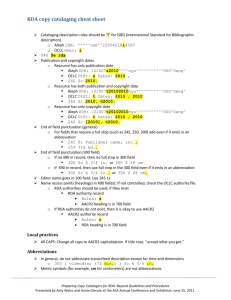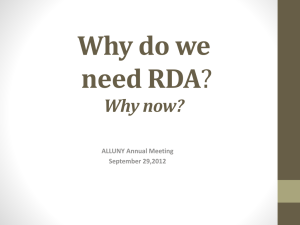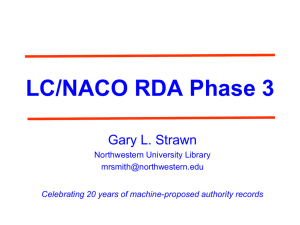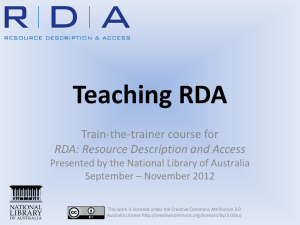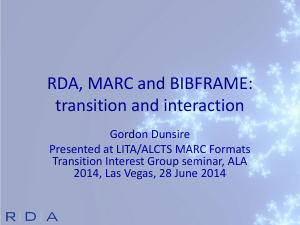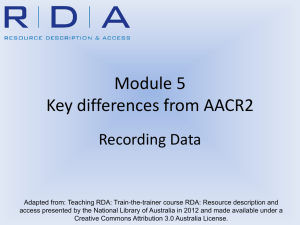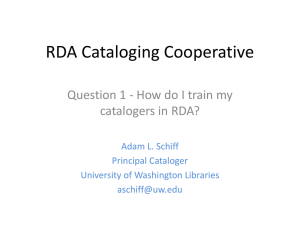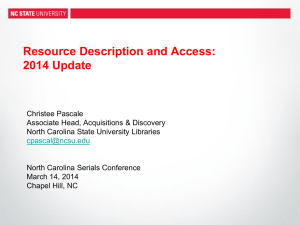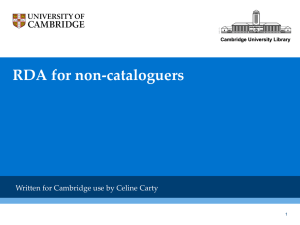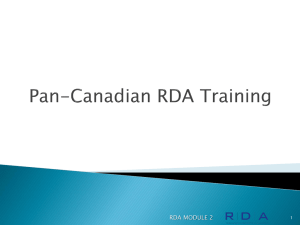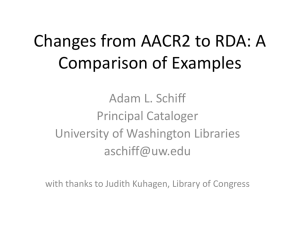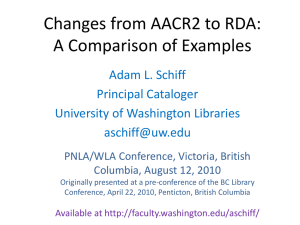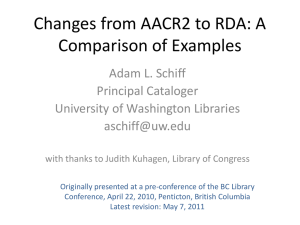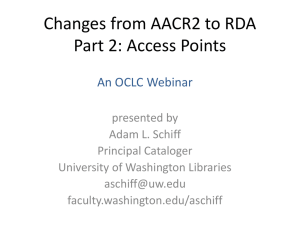RDA for print, June 2013
advertisement
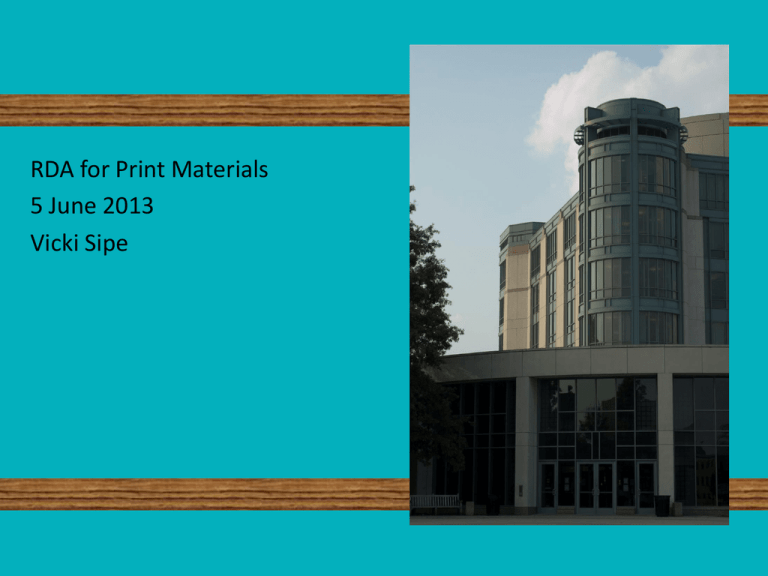
RDA for Print Materials 5 June 2013 Vicki Sipe Resource Description and Access Timeline Tested and analyzed during 2010-2011 Implemented March 31, 2013 by Library of Congress Overview Built on foundations of AACR2 Instructions largely modified from AACR2 precedents Organized around the FRBR entities—Work, Expression, Manifestation, and Item 2 RDA is not AACR2 views the world thru… emphasis on machine actionable data as a result… 3 RDA is not AACR2 increases granularity of data adds new elements compared to AACR2 4 RDA is not AACR2 Attempts to deal with some known issues olive oil glass cruet content vs. carrier 5 AACR2 to RDA changes in terminology • heading authorized access point • author, composer, etc. creator • main entry preferred title + authorized access point for creator if appropriate • physical description carrier description 6 Identifying RDA records • • • • • Fixed Field Descriptive Cataloging Form 040 $e rda New 264 field New 3xx fields Lack of familiar abbreviations 7 Descriptive Cataloging Form field Leader/18 Descriptive Cataloging RDA record—set to “i” or blank AACR2 record—set to “a” Display in OCLC Display in Aleph open form view Display in Aleph bibliographic record 8 040 Cataloging Source field $ e rda 040 codes for Cataloging Source $e is Descriptive Conventions “rda” = Cataloged using RDA Display in OCLC Display in Aleph 9 New 264 field—repeated field example 264—Production, Publication, Distribution, Manufacture, and Copyright Notice Display in OCLC Second indicator values: 0 = production 1 = publication 2 = distribution 3 = manufacture 4 = copyright 1st 264 is about publication 2nd 264 is about copyright Display in Aleph 10 Fixed field dates—with repeated 264 example 008/06 Type of Date/Publication Status “t” = publication and copyright dates 008/7-10 Date 1 production, publication, distribution, manufacture 008/11-14 Date 2 Display in OCLC copyright Display in Aleph bibliographic record Display in Aleph open form view 11 New 264 field—single field examples One 264 with 2 dates Display in OCLC holdover from testing period Fixed fields coded for publication and copyright dates One 264 with one date holdover from testing period Fixed fields “s” = single known date/probable date Date 2 [blank] 12 New 264 field—with 260 field 260 field remains valid new records with only 260 will continue to be produced New 264 field with 260 field holdover of testing period 264 coded for copyright date 13 New 33x Physical Description fields Display in OCLC 336—Content type 337—Media type 338—Carrier type Each field is repeatable Each field has the same subfields Among the subfields are: $a for term from a controlled list $b for code from a controlled list $2 for source of list Display in Aleph 14 Lack of familiar abbreviations RDA prefers spelling out words 15 Capitalization RDA allows “take what you see” – title all in caps Or Use capitalization rules established in AACR2 – title in sentence case Title page 16 Capitalization “Take what you see” allows many variations on how a title can look in a record It is valid, if that is what you see on the title page 17 Relationship designators, $e in 100 and 700 RDA emphasizes relationships these are expressed as $e Relator Term terms come from lists in RDA 18 Errors in the title 19 S.l. s.n. are gone AACR2 RDA use S.l. if place of publication unknown use s.n. if name of publisher unknown Additional information on printing and copyright date... use “place of publication not identified” use “publisher not identified” becomes additional 264 fields. Both records are a match for the same piece 20 Multiple places of publication not required to be listed AACR2 RDA include the first place of publication and the first place in the US only first place of publication is required Both records are a match for the same piece 21 “Rule of Three” is no longer the rule, but an option RDA all editors, authors, etc. may be listed in statement of responsibility AACR2 cuts it off at 3 and substitutes [et al.] Title page 22 Parallel titles RDA—parallel titles can come from any source within the resource title page, spine, cover, etc. AACR2—parallel titles must appear on the chief source of information 23 Questions?
